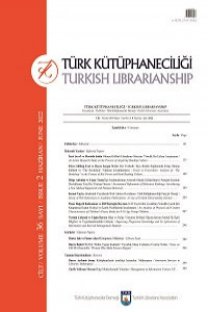Paths of' discovery: Comparing the search effectiveness of' EBSCO Discovery Service, Summon, Google Scholar, and conventional library resources
Bilimsel yayın sayısı arttıkça kullanıcılar için en ilgili ve dikkate değer kaynakları diğerleri arasında seçmek zorlaşmaktadır Henning ve Gunn, 2012 . Bulut hesaplama yöntemi kullanan Google gibi arama motorları kullanıcı gereksinimlerine hızla cevap vererek arama sonuçlarında ilgili belgeleri başarıyla sıralamaktadır Johnson, Levine ve Smith, 2009 . Kütüphaneler bu ortamda kullanıcıların giderek artan beklentilerini karşılamak için koleksiyonlarındaki basılı ve elektronik kaynaklara sadece bir arayüzden erişim imkânı sağlayan sistemler kullanmaktadır. Çalışmada hem nicel hem nitel yöntem kullanılarak Bucknell Üniversitesi BÜ ve Illinois Wesleyan Üniversitesi IWÜ ’nden kullanıcıların Serial Solutions Summon, EBSCO Discovery Service EDS web keşif araçları ile Google Scholar GS ve geleneksel kütüphane veri tabanlarının arama etkinlikleri karşılaştırılmıştır.
Anahtar Kelimeler:
Arama motorları, kaynak arama, arama yolları, web keşif araçları, arama etkinliği
Paths of' discovery: Comparing the search effectiveness of' EBSCO Discovery Service, Summon, Google Scholar, and conventional library resources
It is becominghard for users to select significant sources among many others as number of scientific publications increase Henning and Gunn, 2012 . Search engines that are using cloud computing methods such as Google can list related documents successfully answering user requirements Johnson, Levine and Smith, 2009 . In order to meet users’ increasing demands, libraries started to use systems which enable users to access printed and electronic sources through a single interface. This study uses quantitative and qualitative methods to compare search effectiveness between Serial Solutions Summon, EBSCO Discovery Service EDS web discovery tools, Google Scholar GS and conventional library databasesamong users from Bucknell University and Illinois Wesleyan University
Keywords:
Searchengines, searching, paths of search, web discovery tools, search effectiveness,
___
Augustine, S. ve Greene, C. (2002). Discovering how students search a library Web site: A usability case study. College & Research Libraries, 63(4), 354-365. 13 Kasım 2013 tarihinde http://crl.acrl.org/ content/63/4/354.shortadresinden erişildi.Cockrell, B. J. ve Jayne, E. A. (2002). How do I find an article? Insights from a web usability study. The Journal of Academic Librarianship, 28(3), 122-132. 13 Kasım 2013 tarihinde
http://www.sciencedirect.com/science/article/pii/S0099133302002793 adresindenerişildi.
Eliasen, K., McKinstry, J., Fraser, B. M., ve Babbitt, E. P. (1997). Navigating online menus: A quantitative experiment. College & Research Libraries, 58(6), 509-516. 13 Kasım 2013 tarihinde http://crl. acrl.org/content/58/6/509.shortadresinden erişildi.
Henning V. ve Gunn W. (2012). “Impact factor: Researchers should define the metrics that matter to them.”. 13 Kasım 2013 tarihinde http://www.guardian.co.uk/higher-education-network/ blog/2012/sep/06/mendeley-altmetricss-open-access-publishing adresinden erişildi.
Johnson, L., Levine, A., ve Smith, R. (2009). The 2009 Horizon Report. Austin, Texas: The New Media Consortium. 13 Kasım 2013 tarihinde http://wp.nmc.org/horizon2009/ adresinden erişildi.
Koohang,A. (2004). Development and validation of an instrument for assessing users’ views about the usability ofdigital libraries. Issues in Informing Science and Information Technology, 1, 55 63. 13 Kasım 2013 tarihinde http://proceedings.informingscience.org/InSITE2004/018kooha.pdf adresinden erişildi.
- Başlangıç: 1952
- Yayıncı: Türk Kütüphaneciler Derneği
Sayıdaki Diğer Makaleler
Information behavior: an evolutionary instinct. Berlin; New York: Springer
Açık Eğitim Kaynaklarının Gelişimi ve Türkiye’de Uygulama Alanları
Aydan ŞEN BAYSAL, Hüseyin ÇAKIR, Mehmet TOPLU
Bilgi Yönetilebilir mi? Kavramsal Bir Yaklaşım
Açık Eğitim Kaynaklarının Gelişimi ve Türkiye'de Uygulama Alanları
Mehmet TOPLU, Hüseyin ÇAKIR, Aydan ŞEN BAYSAL
